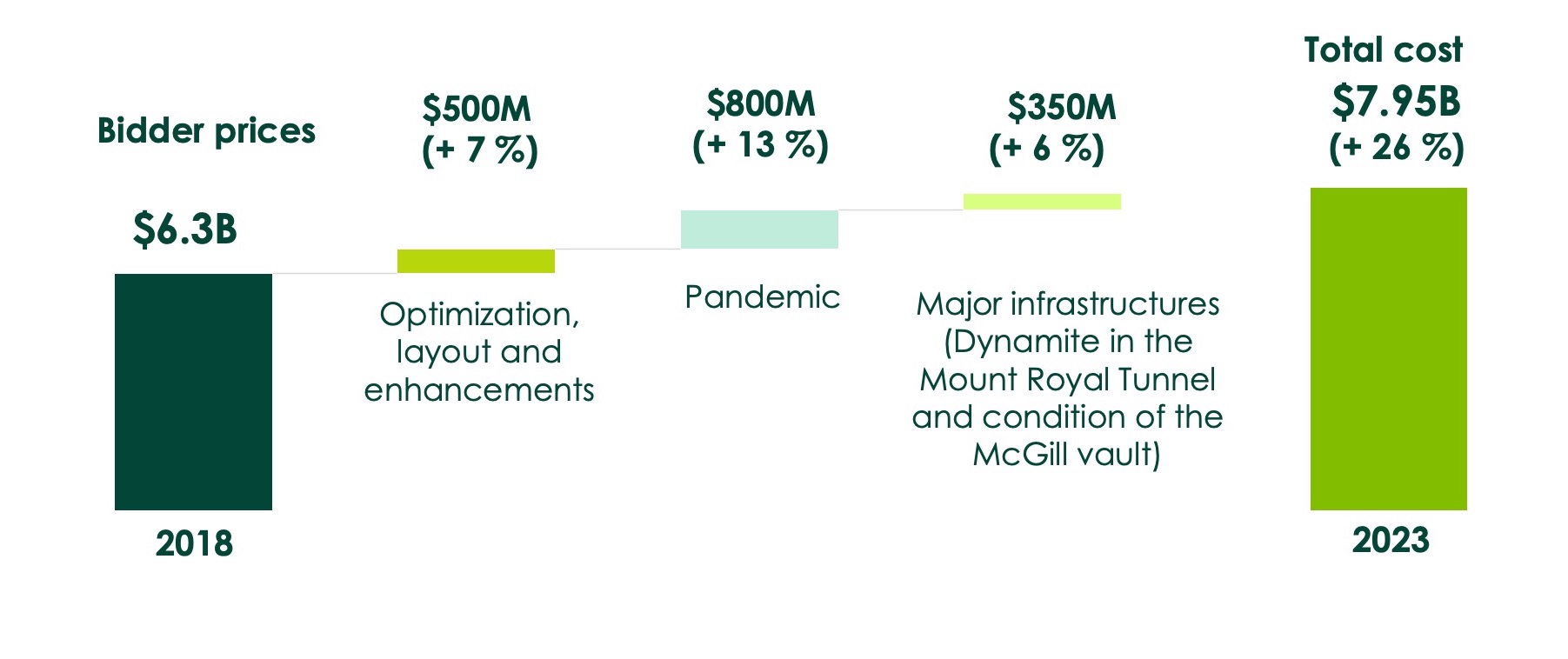
Réseau express métropolitain: Project Update
- More than one million passages reached on the South Shore branch, with a 99% service reliability rate from the first few weeks
- Of 67 km of network, including 17 km already in service, 85% is completed in unprecedented construction circumstances
- Additional costs of $1.65 billion represent a 26% increase over the cost presented when bidders were selected, for a total of $7.95 billion
- Excluding the exceptional $800 million impact of the pandemic limits the cost increase to 13%
Media representatives were invited to an update on the first weeks of operation of the REM South Shore branch, the next stages of work to be carried out on the entire network, and a financial update on the project.
“The past few weeks have seen us reach a very important milestone with the commissioning of the South Shore branch, linking Brossard to Montréal’s Central Station. In the context of recent years, to have delivered this, in addition to having completed 85% of the network’s other branches, within an extremely competitive budget, is exceptional. I salute the commitment of the thousands of people who are still hard at work on completing the REM and creating the world’s largest automated light rail transit line, right here in Quebec,” said Jean-Marc Arbaud, President and CEO of CDPQ Infra.
A look back at the first weeks of operation
Since July 31, REM cars have made over a million trips. With a daily average of 30,000 trips, the busiest day was September 7, with 35,000 passages.
From the start of its run-in period, the REM’s reliability rate was high at 99%, i.e. 860 hours of operation and six service interruptions, for a total of eight hours.
Over the course of the run-in period, the teams identified elements that are currently being upgraded, mainly escalators, elevators and communications during service interruptions.
The REM team recognizes the importance of quickly solving the issues, and is working on them with its operator GPMM, made up of teams from Alstom and SNC-Lavalin.
Next work steps
For the West Island and North Shore branches, the civil engineering work is largely complete, and CDPQ Infra is now starting to finalize the 19 stations, install the control systems, finalize the rail tracks and electrification. Testing on the branches will begin in spring 2024.
On the airport branch, teams will soon be busy installing the rail tracks in 2024. Commissioning for this section is scheduled for 2027, in line with Montréal Airport’s timetable for completing the station.
Financial update
Over the past five years, the REM construction period has been marked by extraordinary circumstances and exceptional technical challenges. Despite these constraints, CDPQ Infra and its partners were able to keep the project within a very competitive budget compared with other similar major transportation projects around the world.
The project cost $7.95 billion, up $1.65 billion from the original $6.3 billion confirmed when bidders were selected in 2018. This is a 26% increase over the original cost. Excluding the impact of the pandemic limits the cost increase to 13%.
The increase in project costs breaks down as follows:
- Global pandemic ($800 million): the pandemic and the conflict in Ukraine had a major impact on supply chains, the price and availability of goods and labour both local and international. Additionally, it led to the closure of worksites and the adoption of stringent sanitary measures for several months. These items account for half of the increase in project costs.
- Mount Royal Tunnel and condition of the underground vault ($350 million): starting in 2020, REM teams had to adopt innovative measures to meet the multiple construction challenges associated with the discovery of a century-old dynamite charge in the Mount Royal Tunnel and the severe deterioration of its central wall in the southern section, under McGill College Avenue. The vault under McGill College Avenue has been completely replaced, and the central wall is now complete. With investments of $350 million, we can count on major transportation infrastructures that have been renovated for the coming decades.
- Optimization, upgrades and improvements ($500 million): This amount includes costs from two sources.
- $350 million related to work optimization and infrastructure developments carried out by third parties and rail operators.
- $150 million in response to various requests received from communities to improve access and layout around REM stations to better serve future users.
Initial project cost increased by 26%
(13% excluding the exceptional impact of the pandemic)

It should be noted that for the planning period from 2016 to 2018, the value of the project had already been adjusted from $5.5 billion to $6.3 billion to take major improvements into account, including the addition of three new stations and 40 cars to enhance service quality.
Under the REM financing package, the additional $1.65 billion investment required to complete the project will be fully absorbed by CDPQ Infra. In addition, the project’s main financial parameters, such as the passenger/km fare adjusted for price indexes and the expected performance target, are not affected.
A detailed technical presentation is available in the documentation section.
- 30 -